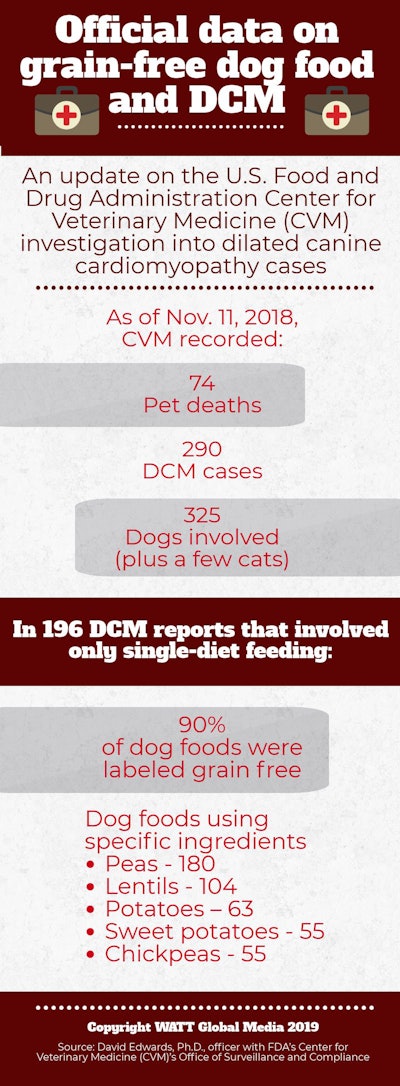
Since launching their investigation more than half a year ago, the U.S. Food and Drug Administration has compiled statistics about cases of canine dilated cardiomyopathy correlated to certain grain-free dog diets. [see infographic below] The data came from David Edwards, Ph.D., an officer with FDA’s Center for Veterinary Medicine (CVM)’s Office of Surveillance and Compliance, during the American Feed Industry Association’s 12th Annual Pet Food Conference.
Background of dilated canine cardiomyopathy investigation
In July, the U. S. Food and Drug Administration alerted pet owners and veterinary professionals about reports of canine dilated cardiomyopathy (DCM) in dog breeds without genetic predispositions to the disease. Although not associated by heredity, the dogs did share a common factor. They frequently ate dog foods containing peas, lentils, other legume seeds, or potatoes as main ingredients.
High levels of legumes or potatoes appear in diets labeled as grain-free, which the FDA pointed out in their warning, but it remains unknown how these ingredients are linked to cases of DCM.
Findings from federal investigation of dog heart disease and diet
The FDA’s Center for Veterinary Medicine and the Veterinary Laboratory Investigation and Response Network, a collaboration of government and veterinary diagnostic laboratories, continue investigating this potential association.
Diets in cases reported to the FDA frequently listed potatoes or multiple legumes such as peas, lentils, other pulses (seeds of legumes), and their protein, starch and fiber derivatives early in the ingredient list, indicating that they are main ingredients. Early reports from the veterinary cardiology community indicate that the dogs consistently ate these foods as their primary source of nutrition for months to years.
In the reports the FDA has received, some of the dogs showed signs of heart disease, including decreased energy, cough, difficulty breathing and episodes of collapse. Medical records for four atypical DCM cases, three Golden Retrievers and one Labrador Retriever, show that these dogs had low whole blood levels of the amino acid taurine. Taurine deficiency is documented as potentially leading to DCM.
















